
Including pumping in your breastfeeding journey is a LOT easier with the right set-up. Our checklists will give you an idea of what you need on hand – and what's just plain nice to have – in various situations you might find yourself pumping.

Pumping at home
It takes a village, so take the opportunity to get loved ones who are keen to help with feeds, involved in cleaning your pump parts too!
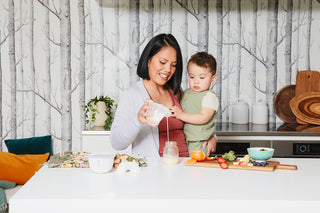
Need to have:
- Your pump
- Correct size breast shield convertors or cushions
- Sterilised storage containers and bottles/teats for feeding
- Dedicated washtub
- Dedicated brushes
- Dedicated drying rack
- Steriliser
- Charging cables
- Water bottle
- Snacks!
- Photos of your little one
Nice to have:
- A loved one on hand who is trained in the art of bottle and pump cleaning and sterilising
- A timer to prevent leaving your pump on charge too long
- Your favourite nipple balm or Silverettes
- An app (My YOUHA) or notepad to record how much you’ve pumped
- Lactation Massager
- Breast milk collection shells or reusable/disposable breast pads (for in between pumps)
- Affirmation cards

Pumping on the go
Gorgeous weather for a walk? Need to do a grocery run? What are you waiting for? Grab your wearable pump and go for it!
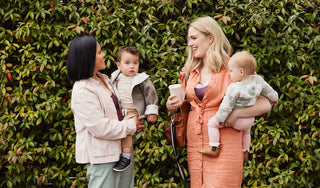
Need to have:
- Your wearable pump, fully charged
- Correct size breast shield convertors or cushions
- Sterilised storage containers
- Pump bag and cooler bag for milk
- Frozen ice block (if it's hot or you'll be out for longer than room temperature storage will allow)
- Water bottle
- Snacks!
Nice to have:
- Photos of your little one
- Breast milk collection shells or reusable/disposable breast pads (for in between pumps)
- Your favourite nipple balm or Silverettes
- An app (My YOUHA) or notepad to record how much you’ve pumped
- Affirmation cards

Pumping at work
Bridging breastfeeding through your workday or shift needn't be daunting. Stay organised and consider a spare kit to ease the workload.
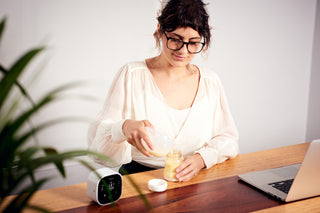
Need to have:
- Check in with your workplace to ensure they have pumping support in place for you*
- Your pump, fully charged
- Correct size breast shield convertors or cushions
- Pump bag and cooler bag for milk
- Sterilised storage containers or bottles
- Water bottle
- Snacks!
- Photos of your little one
and, if you're needing to pump multiple times during your working day:
- Charging cables for your pump motor (just in case)
- A spare set of pump parts and cups, bottles or bags to use with your pump motor/s so there's no need to clean between each session, or
- Dedicated washtub, brushes, and drying rack for cleaning
Nice to have:
- Spare bra and shirt for work
- Breast milk collection shells or reusable/disposable breast pads (for in between pumps)
- Your favourite nipple balm or Silverettes
- An app (My YOUHA) or notepad to record how much you’ve pumped
- Lactation Massager
- Affirmation cards
*The Australian Breastfeeding Association has great resources for working pumpers and employers alike. You'll need adequate breaks for pumping, access to hand-washing facilities and a clean and private space where you can pump or set up your wearable pump, a refrigerator to store your expressed milk and safe storage for your pump. Don't worry if the above protected measures are not already in place, your workplace will have time to set these up during your maternity leave if you start the conversation early.

Pumping overnight
Pumping can be a necessary part of indulging in a night away – with or without – your little one. Be prepared and keep your stash safe, while away and in transit.

Need to have:
- Your pump, fully charged
- Correct size breast shield convertors or cushions
- Pump bag and cooler bag for milk
- Sterilised storage containers and bottles
- Fridge/freezer at your accommodation
- Freezer block to get your milk back home after your trip if necessary
- Charger or charging cables for pump motor
- Steriliser
- Water bottle
- Snacks!
- Photos of your little one
Nice to have:
- Lactation Massager
- Breast milk collection shells or reusable/disposable breast pads (for in between pumps)
- Your favourite nipple balm or Silverettes
- An app (My YOUHA) or notepad to record how much you’ve pumped
- Affirmation cards

Hospital Bag Prep
Prepping for birth? Be sure to include a pair of breast shield convertors in your size, they'll be an excellent insurance policy should you end up needing to pump with the hospital's pump.
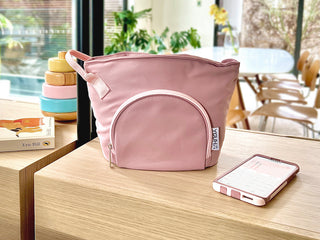
Need to have:
You've probably been assured that the maternity ward at your hospital will have breast pumps you can borrow or hire if you happen to need them. This is indeed an incredible support to be able to rely on, however, it's important to realise that the hospital is unlikely to have everyone's sizing accounted for within their range of standard flanges sizes.
For this reason, our in-house lactation expert, IBCLC Kate, encourages everyone preparing for birth to measure themselves for a set of breast shield convertors and take them along in their hospital bag. In case the need to pump arises, this little device will help protect your nipples from discomfort and damage, as well as ensure that you are stimulating as much milk production as possible, as quickly as possible.
If you do have your own pump, sterilise it and bring it along. There can be long waits for the hospital pumps, and they may not always be available when you need one, so having access to your own pump in hospital can be a relief!
Nice to have:
- The details of your preferred pump (in case you do end up needing your own, you'll be confident in your choice and able to delegate its purchase to a loved one)
- Breast milk collection shells or reusable/disposable breast pads (for in between feeds/pumps)
- Your favourite nipple balm or Silverettes
- An app (My YOUHA) or notepad to record how much you’ve pumped
- Affirmation cards
For more help getting your pumping set up sorted, check out the Your Youha section!
Get Super Pumped about...
More helpful insider and expert pumping tips
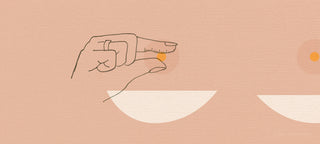
Why breast pump flange sizing matters
A breast pump – however fabulous! – is only as good as its fit. No pump manufacturer can account for everyone's sizing straight out of the box. Learn how to refine the fit of your breast pump flange sizing using our sizing quiz and tips from IBCLC Kate to ensure your pump is as comfortable and effective as it can be.
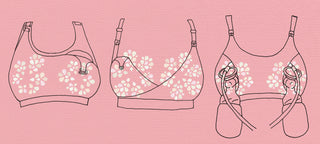
How breastmilk is produced
Take the mystery (but by no means the magic!) out of milk production. With the help of IBCLC Kate, we'll take you through how breast milk is produced by your body, what influence you have, and the stages involved – from early milk to maintaining an established supply.

How to use a breast pump like a boss
Breast pumps offer us unprecedented convenience. So, when everyone's pumping experience is unique, how can you best set yourself up for a successful pumping journey? Get a leg up the learning curve with IBCLC Kate's top tips for getting the most out of your pump, and your time pumping!
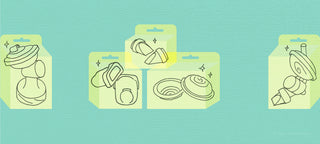
Benefits of replacing your breast pump parts
Breast pump parts wear out. Consider it a badge of honour. The good news is: new parts = new pump! Let us take you through why, what, when and how to replace and recycle your worn out parts so you can enjoy optimum performance from your breast pump once more. Save time, pressure, battery and output by following our helpful tips.
